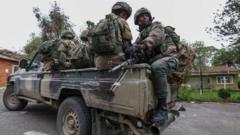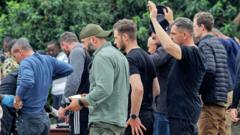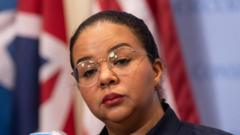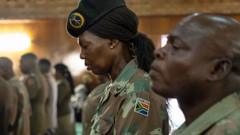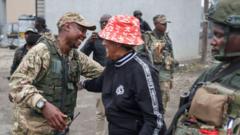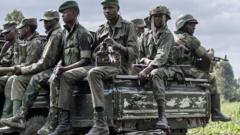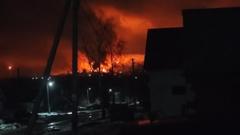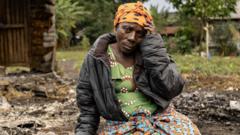The M23 rebel group, reportedly supported by Rwanda, has seized Masisi, a significant town in the Democratic Republic of Congo, escalating tensions in the region.
Rwanda-Backed M23 Rebels Capture Strategic Town in Eastern DR Congo
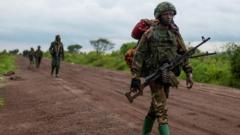
Rwanda-Backed M23 Rebels Capture Strategic Town in Eastern DR Congo
Conflict Intensifies as Rebels Seize Masisi in North Kivu Province
In a swift movement, rebel forces associated with Rwanda have taken control of Masisi, a critical town in the eastern Democratic Republic of Congo's North Kivu province. This seizure marks the second town captured by the M23 group in just two days, raising concerns about the ongoing humanitarian crisis and instability in the resource-rich area. The M23 rebels claim their actions are aimed at protecting ethnic Tutsis from perceived threats, a sentiment underscored by their recent community engagements in the newly acquired town.
Local officials have voiced alarm over the violent takeover, which comes amidst failed mediation efforts between Congolese President Félix Tshisekedi and Rwandan President Paul Kagame, mediated by Angola. Alexis Bahunga, a member of the North Kivu provincial assembly, expressed distress over the implications for the region, noting that the military must enhance its capabilities to combat the growing threat.
As the conflict rages, reports suggest the M23 had convened with Masisi residents to state their aim of liberating the nation. While the Congolese government has remained silent on the matter, humanitarian concerns mount following the recent uproar which has displaced many families.
Masisi, home to approximately 40,000 residents, is located 80km (50 miles) from Goma, the provincial capital. In a specter of past conflicts, fears are palpable that the M23 may advance toward larger urban centers like Goma, which they briefly occupied in 2012. Despite a lull in fighting last year, skirmishes reignited this December, reiterating a cycle of violence that has plagued the region.
Additionally, Rwanda has acknowledged a UN report that revealed about 4,000 of its soldiers deployed alongside the M23, insisting that the Congolese government has failed to adequately address years of conflict. Rwanda contends that Congolese authorities might be collaborating with elements linked to the 1994 Rwandan genocide against ethnic Tutsis.
Initially formed from another rebel movement in 2012, the M23 purports to safeguard Tutsi interests in eastern DR Congo. However, critics suggest that their motives extend to capitalizing on the region's abundant mineral resources, including gold and cobalt, essential for modern technology. Amidst these tensions, the DR Congo is pursuing legal action against Apple for using these so-called "blood minerals" while the tech company claims to have severed supply ties with both Rwanda and the DR Congo.
The unfolding situation in eastern DR Congo continues to raise alarm, as regional dynamics and international interests overlap in a complex struggle for control and resources.
Local officials have voiced alarm over the violent takeover, which comes amidst failed mediation efforts between Congolese President Félix Tshisekedi and Rwandan President Paul Kagame, mediated by Angola. Alexis Bahunga, a member of the North Kivu provincial assembly, expressed distress over the implications for the region, noting that the military must enhance its capabilities to combat the growing threat.
As the conflict rages, reports suggest the M23 had convened with Masisi residents to state their aim of liberating the nation. While the Congolese government has remained silent on the matter, humanitarian concerns mount following the recent uproar which has displaced many families.
Masisi, home to approximately 40,000 residents, is located 80km (50 miles) from Goma, the provincial capital. In a specter of past conflicts, fears are palpable that the M23 may advance toward larger urban centers like Goma, which they briefly occupied in 2012. Despite a lull in fighting last year, skirmishes reignited this December, reiterating a cycle of violence that has plagued the region.
Additionally, Rwanda has acknowledged a UN report that revealed about 4,000 of its soldiers deployed alongside the M23, insisting that the Congolese government has failed to adequately address years of conflict. Rwanda contends that Congolese authorities might be collaborating with elements linked to the 1994 Rwandan genocide against ethnic Tutsis.
Initially formed from another rebel movement in 2012, the M23 purports to safeguard Tutsi interests in eastern DR Congo. However, critics suggest that their motives extend to capitalizing on the region's abundant mineral resources, including gold and cobalt, essential for modern technology. Amidst these tensions, the DR Congo is pursuing legal action against Apple for using these so-called "blood minerals" while the tech company claims to have severed supply ties with both Rwanda and the DR Congo.
The unfolding situation in eastern DR Congo continues to raise alarm, as regional dynamics and international interests overlap in a complex struggle for control and resources.



